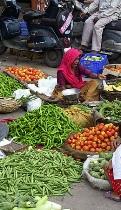 | « Back to article | Print this article |
Inflation cooled to 9.59 per cent in April, although prices of a number of food items and non-food items such as metals rose.
 The fall is partly due to a high base effect - which means the inflation numbers in the year-ago period had already started rising making the current rate of growth look relatively small. Last year this time, inflation was 1.31 per cent, against 1.2 per cent in March 2009.
The fall is partly due to a high base effect - which means the inflation numbers in the year-ago period had already started rising making the current rate of growth look relatively small. Last year this time, inflation was 1.31 per cent, against 1.2 per cent in March 2009.
In March this year, wholesale prices-based inflation was at 9.90 per cent. In Kolkata, the government's chief economic advisor Kaushik Basu said inflation would fluctuate in the next three months before falling.
HDFC Chief Economist Abheek Barua said, "May numbers could be around 8.5 per cent as the base was quite high last year. Although there might be some increase in June because of base effect."
With inflation easing, economists do not anticipate any immediate policy actions from the Reserve Bank as industrial growth is showing signs of deceleration and the Eurozone debt crisis may affect fund flows.
Factory production in March expanded by a slower than expected 13.5 per cent. Elsewhere, the stock markets turned edgy after investors worried about the efficacy of a Euro 110 package approved by EU-IMF to bail out Greece from its debt obligations.
"With the global uncertainty and lower than expected March industrial growth numbers, RBI would not adopt any drastic step and rather resort to a gradual approach towards rate hike," said StanChart Bank Regional Head of Research, India, Samiran Chakraborty.
According to the monthly inflation data, potato prices fell 28.70 per cent in April, and onion prices dropped 11.62 per cent. However, vegetables overall rose 31.90 per cent, which means that prices, except for potatoes and onions, are rising much faster. Sugar prices fell by 5.74 per cent on monthly basis, but turned costlier compared to last year.
For April, food inflation stood at 16.87 per cent against 16.65 per cent in the previous month with prices of pulses rising by 2.47 per cent and milk by 2.96 per cent.
On yearly basis, these prices rise much faster--pulses by 30.42 per cent and milk by 21.95 per cent. Also fuel prices rose 12.55 per cent, essentially because the Budget hiked customs and excise duty on petrol and diesel. The main area of concern, however, remained metal, since hardening global prices are putting pressure on domestic rates.
Iron and steel prices rose 11.40 per cent in April on monthly basis and basic metal alloys and metal products turned expensive by 6.72 per cent.